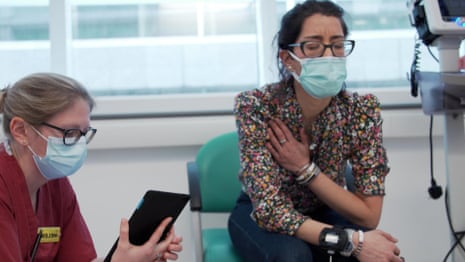Working seven days a week as a nurse and a fitness instructor, while bringing up two young daughters, Rebecca Logan led an extremely active life – until she contracted Covid-19 while working in the emergency department of a hospital in Northern Ireland.
Over a year after first falling ill, the 40-year-old is still suffering from long Covid. For Logan, that means she can only walk for five minutes before needing to rest, and there is a constant ringing in her ears. Her husband has had to pick up the slack at home, alongside his job as a school principal.
“The type of person that I was, I never would have believed someone could be that tired; that fatigue could affect you that badly. But tiredness and fatigue don’t really cover it, your body just seems to stop functioning,” she said.
Logan is far from alone in her experience of ongoing illness.
More than 2 million people in England may have had long Covid, according to figures published this week which highlight the scale of the disease across the UK, and the challenges it poses. The React study, by Imperial College, shows about a third of people who report they have coronavirus symptoms continue to suffer from them for at least 12 weeks.
The human and financial costs for those scarred by the disease are only beginning to be calculated. Each case highlights varying symptoms, a differing speed of recovery – and multiple problems around returning to work or, for those who cannot, claiming financial support.
Many long Covid sufferers who fell ill in the first six months of the pandemic are now reaching the end of their sick pay entitlement, and having to apply for benefits.
“Statutory sick pay runs out after six months, and it can’t be classed as a long-term disability unless you have been living with it for 12 months, so you have got this obvious gap,” said MP Layla Moran, chair of the all-party parliamentary group (APPG) on coronavirus.
Moran and other MPs in the APPG have urged the prime minister to fund a compensation scheme for frontline workers suffering from the condition. They also want the illness recognised as an occupational disease, to give added protection to employees, and government guidelines on how employers must support staff while they are sick and to ensure their safe return to work when possible.
Logan says she feels “abandoned and neglected” by her employer, an NHS trust. The trust covered sick pay for 21 weeks, after which she received the maximum 28 weeks statutory sick pay from the government, which totals £96.35 per week. Now she is no longer being paid and has successfully applied for personal independence payment (PIP), a benefit for people who have a long-term physical or mental health condition or disability.
She hopes in time to return to nursing, but doesn’t know when she will be well enough.
 View image in fullscreenTeacher Toni Shelley. Photograph: Handout
View image in fullscreenTeacher Toni Shelley. Photograph: Handout
Long Covid has forced Toni Shelley, a 34-year-old secondary school teacher from Leicester, to leave the profession she has loved working in for a decade.
“I’m just not going to be able to teach again,” Shelley said. “When or if I recover from the physical aspect, the emotional trauma of working during the pandemic will be too much for me to enter a job that is that stressful again.”
Seven months after first catching coronavirus – she believes it was from an outbreak at her school – Shelley still has to spend most days in bed because of extreme fatigue. She has taken the difficult decision to resign from her job, and is now on the countdown to her sick pay running out at the end of August.
“I feel a bit heartbroken that I have given my life to public service,” Shelley said. “To be left with nothing, no support, I haven’t even had a ‘get well soon’ card from my school. They don’t necessarily believe that it’s long Covid.”
With financial pressure mounting, Shelley’s partner has taken on a second job to ensure the couple can pay the mortgage on their recently acquired first property.
Sign up to the daily Business Today email or follow Guardian Business on Twitter at @BusinessDesk
Thomas Dekeyser, a postdoctoral researcher at Royal Holloway, University of London, is among those who do feel supported by their employer. The 31-year-old said the university and his mentor were understanding and patient during the 10 months he was severely affected with long Covid, and unable to work. They have also helped him slowly return to full-time work.
“I can’t imagine what it must be like to physically struggle, emotionally struggle, and on top of that also financially struggle. I have no idea how I would have dealt with that,” Dekeyser said.
Human resources consultant Kate Underwood believes employers should be conducting “return to work” interviews with staff who have been sick, to find out how best to accommodate them.
“It is about being reasonable,” Underwood said. “If someone says they can work for half a day in the morning because they are better in the mornings, and from home, just let them do it. For their own mental health it is going to be the best thing for them.”
Dealing with long Covid and managing a return to work are a clear balancing act for employers and their employees. However, it is clear that not all organisations have been entirely sympathetic to the needs of their workers.
“Long Covid is a new health condition, so there is no long-term prognosis” said Vanessa James, partner in the employment team at law firm Ashfords. “The challenge to come is identifying when people can’t work and how long that is going to impact them,” James said.
The length of time an employee can expect to receive sick pay depends on their contract, and often on the sector they work in. Not all jobs would allow for someone to return to work following certain adjustments, such as a reduction in working hours or the ability to work from home.
Moran said recognising long Covid as an occupational disease would help staff argue for adjustments from employers.
 00:11:06Inside a long Covid clinic: ’I look normal, but my body is breaking down’ – video
00:11:06Inside a long Covid clinic: ’I look normal, but my body is breaking down’ – video
“There are occupations which already have a shortage of workers, who we are finding are not able to return or are returning on a part-time basis, and unless we get this right, we are going to find people needlessly leaving certain professions because they aren’t getting the support,” Moran said.
For now, many are facing financial hardship as they come to the end of their sick pay entitlement.
“I’m concerned for people running out of money, it’s as basic as that,” said James at law firm Ashfords. “If they haven’t got a gold-plated contract or some kind of long-term income protection insurance policy, which most people don’t unless they are in a corporate highly paid job, then my concern is that people will genuinely be in situations of poverty and need.”
Clive Kay-Lightfoot, 57, from Hampshire, is certain he caught Covid in November from a colleague at an electrical wholesaler who had tested positive. The store, which was considered an essential retailer, continued to operate during England’s second lockdown.
“It has been extremely bad timing all the way through,” Kay-Lightfoot said. He had only begun this particular job in March 2020, just before the pandemic took hold, meaning he was only entitled to statutory sick pay.
His employment was terminated at the end of that period, which was within the law as he had less than two years’ service. Kay-Lightfoot is now claiming employment and support allowance (ESA) from the government, which is a benefit paid to people under state pension age who have a disability or health condition which affects how much they can work.
Others are now seeking legal recourse. Helen* had her job in financial services terminated by her employer 11 months after she first contracted Covid. Despite having worked for the company for five years, the 52-year old said her employment was ended without appropriate medical evidence being obtained. Helen intends to challenge the decision at an employment tribunal and is also currently receiving ESA.
“There is a lot of room for injustice here and disparity of treatment and potential poverty for people,” said James.
There are concerns that much of the problem is being masked – either by continued home working, or because workers are still receiving support through the furlough scheme. However, government support is being tapered from July, and will be withdrawn entirely in September.
Moran said: “I think we are going to find in September that is when the crunch is really going to come.”
(*Not her real name.)




